|
Books Should Be Free Loyal Books Free Public Domain Audiobooks & eBook Downloads |
|
|
Books Should Be Free Loyal Books Free Public Domain Audiobooks & eBook Downloads |
|
Top Authors |
|---|
|
Book type:
Sort by:
|
By: Allan Pinkerton (1819-1884) | |
|---|---|
 The Expressman and the Detective
The Expressman and the Detective
Allan Pinkerton (1819-1884), a Scotsman by birth and a barrel-maker by trade, settled in Chicago in its infancy and founded the Pinkertons, the world's first detective agency. Though events associated with the agency after his death have tarnished the name, Pinkerton himself was one of the original human rights advocates. He was a dear friend to John Brown, an advisor to Abraham Lincoln, and 80 years ahead of his time in hiring female detectives. He was also stubborn, irascible, and an egomaniac... | |
 The Burglar's Fate And The Detectives
The Burglar's Fate And The Detectives
| |
 The Spiritualists and the Detectives
The Spiritualists and the Detectives
| |
 The Somnambulist and the Detective The Murderer and the Fortune Teller
The Somnambulist and the Detective The Murderer and the Fortune Teller
| |
 The Spy of the Rebellion Being a True History of the Spy System of the United States Army during the Late Rebellion,
The Spy of the Rebellion Being a True History of the Spy System of the United States Army during the Late Rebellion,
| |
 Bucholz and the Detectives
Bucholz and the Detectives
| |
 Mississippi Outlaws and the Detectives Don Pedro and the Detectives; Poisoner and the Detectives
Mississippi Outlaws and the Detectives Don Pedro and the Detectives; Poisoner and the Detectives
| |
By: Thomas Lodge | |
|---|---|
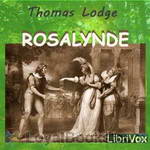 Rosalynde or, Euphues' Golden Legacie
Rosalynde or, Euphues' Golden Legacie
This novel, which Shakespeare adapted in his pastoral comedy As You Like It, is the archetypal pastoral adventure. Two young persons of high birth, who have recently lost their fathers (one to death, one to banishment), fall in love but are separated almost at once and forced to flee to the Forest of Arden. There they meet again, but as Rosalynde is disguised for safety as a boy, named Ganymede, her lover Rosader does not recognize her. Once Rosader has confided his love to Ganymede, they play a game in which the "boy" poses as Rosalynde to give Rosader practice in wooing... | |
By: William Beckford (1760-1844) | |
|---|---|
 The History of the Caliph Vathek
The History of the Caliph Vathek
This is one of the earliest Gothic novels. The Caliph Vathek is one of the wealthiest and most powerful men who ever lived. But this is not enough for him. He seeks also forbidden knowledge, and doesn't care who he has to hurt to get it. Aided by his depraved mother Carathis, Vathek proceeds to damn himself, and those around him. (Introduction by MorganScorpion) | |
By: Jakob Wassermann (1873-1934) | |
|---|---|
 The Goose Man
The Goose Man
| |
By: William Beckford (1759-1844) | |
|---|---|
 Dreams, Waking Thoughts, and Incidents
Dreams, Waking Thoughts, and Incidents
| |
By: Robert Sterling Yard (1861-1945) | |
|---|---|
 The Book of the National Parks
The Book of the National Parks
Robert Sterling Yard (February 1, 1861 – May 17, 1945) was an American writer, journalist, and wilderness activist. Born in Haverstraw, New York, Yard graduated from Princeton University and spent the first twenty years of his career in the editing and publishing business. In 1915, he was recruited by his friend Stephen Mather to help publicize the need for an independent national park agency. Their numerous publications were part of a movement that resulted in legislative support for a National Park Service (NPS) in 1916... | |
By: Robert Hugh Benson (1871-1914) | |
|---|---|
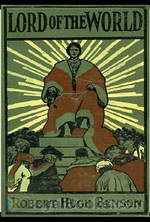 Lord of the World
Lord of the World
“Mr. Benson sees the world, four or five generations hence, free at last from all minor quarrels, and ranged against itself in two camps, Humanitarianism for those who believe in no divinity but that of man, Catholicism for those who believe in no divinity but that of God.” This apocalyptic novel from the early 1900's is sometimes deemed one of the first modern dystopias. | |
 Come Rack! Come Rope!
Come Rack! Come Rope!
Come Rack! Come Rope! is a historical novel by the English priest and writer Robert Hugh Benson, a convert to Catholicism from Anglicanism. Set in Derbyshire at the time of the Elizabethan persecution of Catholics, when being or harboring a priest was considered treason and was punishable with death, it tells the story of two young lovers who give up their chance of happiness together, choosing instead to face imprisonment and martyrdom, so that "God's will" may be done.The book was written nearly nine years after Benson's reception into the Catholic Church... | |
 Lourdes
Lourdes
| |
 Paradoxes of Catholicism
Paradoxes of Catholicism
| |
 None Other Gods
None Other Gods
| |
 Dawn of All
Dawn of All
In a former book, called "Lord of the World," I attempted to sketch the kind of developments a hundred years hence which, I thought, might reasonably be expected if the present lines of what is called "modern thought" were only prolonged far enough; and I was informed repeatedly that the effect of the book was exceedingly depressing and discouraging to optimistic Christians. In the present book I am attempting -- also in parable form -- not in the least to withdraw anything that I said in the former,... | |
 The King's Achievement
The King's Achievement
| |
 Oddsfish!
Oddsfish!
| |
 The History of Richard Raynal, Solitary
The History of Richard Raynal, Solitary
| |
By: Frank Chouteau Brown | |
|---|---|
 Letters and Lettering A Treatise With 200 Examples
Letters and Lettering A Treatise With 200 Examples
| |
By: Elizabeth Inchbald (1753-1821) | |
|---|---|
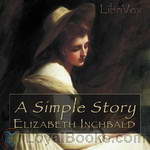 A Simple Story
A Simple Story
The story could really have been simple: Miss Milner, who is admired for her beauty and charm, could have been a socialite, marry a respectable and good looking man and be happy in the standards of her time. But if it was so, why would there be a book? Miss Milner, beautiful and charming as she is, announces her wish to marry her guardian, a catholic priest. But women in the 18th century do not declare their wishes or speak about their passions, and- after all- he is a catholic priest… And if he finds a way to marry her, is this her road to happiness? | |
By: Mary E. Wilkins Freeman (1852-1930) | |
|---|---|
 Evelina's Garden
Evelina's Garden
This is a long short story from 1899, approximately 95 minutes more or less, about a mysterious woman living virtually alone on the outskirts of a small New England town in a mansion with a magnificent garden. (Introduction by BellonaTimes) | |
By: Lucius Apuleius (125?-180) | |
|---|---|
 The Golden Asse
The Golden Asse
| |
 The Apologia and Florida of Apuleius of Madaura
The Apologia and Florida of Apuleius of Madaura
| |
By: Anna Green Winslow (1759-1779) | |
|---|---|
 Diary of Anna Green Winslow A Boston School Girl of 1771
Diary of Anna Green Winslow A Boston School Girl of 1771
| |
By: Kate Greenaway (1846-1901) | |
|---|---|
 Mother Goose or the Old Nursery Rhymes
Mother Goose or the Old Nursery Rhymes
| |
 Language of Flowers
Language of Flowers
| |
 Marigold Garden
Marigold Garden
| |
 Under the Window Pictures & Rhymes for Children
Under the Window Pictures & Rhymes for Children
| |
By: Michel Verne (1861-1925) | |
|---|---|
 In the Year 2889
In the Year 2889
| |
By: Ida B. Wells-Barnett (1862-1931) | |
|---|---|
 Southern Horrors: Lynch Law In All Its Phases
Southern Horrors: Lynch Law In All Its Phases
Thoroughly appalled and sickened by the rising numbers of white-on-black murders in the South since the beginning of Reconstruction, and by the unwillingness of local, state and federal governments to prosecute those who were responsible, Ida Bell Wells-Barnett wrote Southern Horrors, a pamphlet in which she exposed the horrible reality of lynchings to the rest of the nation and to the world. Wells explained, through case study, how the federal government's failure to intervene allowed Southern states... | |
By: Archibald Lampman (1861-1899) | |
|---|---|
 Winter Evening
Winter Evening
Archibald Lampman was a Canadian poet. "He has been described as 'the Canadian Keats;' and he is perhaps the most outstanding exponent of the Canadian school of nature poets." The Canadian Encyclopedia says that he is "generally considered the finest of Canada's late 19th-century poets in English." Lampman is classed as one of Canada's Confederation Poets, a group which also includes Charles G.D. Roberts, Bliss Carman, and Duncan Campbell Scott. | |
By: R. Austin Freeman (1862-1943) | |
|---|---|
 Vanishing Man
Vanishing Man
A young doctor, former student of the legal and medical expert Dr. John Thorndyke, finds himself almost accidentally drawn into a case in which a man has vanished. Perhaps he has died; perhaps not;but the issue is very important because the will that he has left behind is curiously -- annoyingly curiously -- worded. Fortunately, Dr. Thorndyke's rationality combined with his forensic skills, bring the case to a conclusion, while the young doctor meets the love of his life in the Egyptian rooms of the British Museum. ( Nicholas Cifford) | |
By: Roswell Field (1851-1919) | |
|---|---|
 The Romance of an Old Fool
The Romance of an Old Fool
A light-hearted account of a successful middle aged widower who chances to visit the small town in which he grew up to renew old acquaintances and perhaps reflect on his successes since his departure.This visit, however, becomes far more to him than he would have imagined, as he finds that one of his dearest childhood girlfriends had died not long after his departure, and the widower envisions a relationship with none other than her daughter, who he senses to be her mother incarnate. | |
By: Charles Goddard (1879-1951) | |
|---|---|
 The Perils of Pauline
The Perils of Pauline
The Perils of Pauline is one of the first damsel in distress serials. The story is complete with undaunted hero, courageous damsel, unscrupulous villains galore, and other worldly interest. Before getting married, Pauline wants to experience the world and have adventures. When her guardian dies and leaves her an estate in trust of his secretary, adventures suddenly become more hazardous. Pauline charters aeroplanes, meets untrustworthy pirates, braves dangerous China Town, flies in a hot air balloon, adventures in the Wild West, encounters international spies, and escapes many other perils with the aid of her would-be fiancé, Harry, and an Egyptian mummy. | |
By: Charles Goddard and Paul Dicky | |
|---|---|
 The Ghost Breaker
The Ghost Breaker
The Ghost Breaker is a drama and haunted house horror complete with heroes, villains, and a Princess. The Ghost Breaker was originally a screenplay and would later be made a drama film directed by Cecil B. DeMille. | |
By: Charles Goddard (1879-1951) | |
|---|---|
 The Ghost Breaker A Melodramatic Farce in Four Acts
The Ghost Breaker A Melodramatic Farce in Four Acts
| |
By: John Alexander Hammerton (1871-1949) | |
|---|---|
 Mr. Punch's After-Dinner Stories
Mr. Punch's After-Dinner Stories
| |
 Mr. Punch Awheel The Humours of Motoring and Cycling
Mr. Punch Awheel The Humours of Motoring and Cycling
| |
 Mr. Punch's Country Life
Mr. Punch's Country Life
| |
By: George Du Maurier (1834-1896) | |
|---|---|
 Peter Ibbetson
Peter Ibbetson
| |
 Social Pictorial Satire
Social Pictorial Satire
| |
By: John Alexander Hammerton (1871-1949) | |
|---|---|
 The Call of the Town A Tale of Literary Life
The Call of the Town A Tale of Literary Life
| |
By: Ernest Poole (1880-1950) | |
|---|---|
 The Harbor
The Harbor
The Harbor was written in 1915 by Ernest Poole. The novel is considered by many to be one of Poole’s best efforts even though his book, The Family won a Pulitzer Prize. The Harbor is a fictional account of life on a Brooklyn waterfront through the eyes of Billy as he is growing up. The novel starts with Billy the child, living on the harbor with his father, mother, and sister, Sue. During this time he also meets Eleanor who, at that time, he considers to be strange. She later becomes an important character in the novel... | |
 His Family
His Family
The 1910s is historically considered the decade of greatest social change in history. It saw the advent and proliferation of the automobile, electricity, lighting, radio, telephone and cinema. Our present time of change is actually quite tame in comparison, though also breathless. His Family is a tale of a widowed father, working to manage this decade of change as it affects his family in New York City. His Family was the first winner of the Pulitzer Prize for literature in 1919. | |
 His Second Wife
His Second Wife
| |
By: George-Günther Freiherr von Forstner (1882-1940) | |
|---|---|
 The Journal of Submarine Commander Von Forstner
The Journal of Submarine Commander Von Forstner
The Journal of Submarine Commander Von Forstner is a graphic account of WWI submarine warfare. Forstner was the commander of German U-boat U-28. His journal, first published 1916, gives a gritty picture of daily life inside a submarine and details several torpedo attacks on Allied shipping. The 1917 translation of Forstner’s journal into English was unquestionably intended to bolster the Allied war effort. In the foreword, the translator states: “Nothing at the present day has aroused such fear as this invisible enemy, nor has anything outraged the civilized world like the tragedies caused by the German submarines... | |
By: Isabella Valancy Crawford (1850-1887) | |
|---|---|
 Old Spookses' Pass, Malcolm's Katie, and other poems
Old Spookses' Pass, Malcolm's Katie, and other poems
| |
By: May Kellogg Sullivan | |
|---|---|
 A Woman Who Went to Alaska
A Woman Who Went to Alaska
Alaska has only been a state since 1959, and the breathtaking terrain remains mostly unspoiled and natural. In modern times, many of us have had the pleasure of visiting Alaska via a luxurious cruise ship, where we enjoyed gourmet meals, amazing entertainment, and a climate-controlled environment. It's easy to also book a land package that enables you to see more of the country by train.Imagine what it was like to visit the same wild, untamed countryside in 1899. Instead of boarding a sleek, stylish cruise ship, you travel for weeks on a steamer... | |
 The Trail of a Sourdough Life in Alaska
The Trail of a Sourdough Life in Alaska
| |
By: Bertrand Sinclair (1881-1972) | |
|---|---|
 The Hidden Places
The Hidden Places
Hollister, returning home from the war physically scarred but otherwise healthy and intact, finds life difficult among society, and so chooses to roam about a bit seeking a future for himself. He eventually leads himself to a remote area in British Columbia, which begins the tale of the next phase of his life; a life which becomes far richer in totality than he would have imagined in his old unwelcoming haunts. A life among the hidden places. | |
By: Kisari Mohan [Translator] Ganguli | |
|---|---|
 The Mahabharata of Krishna-Dwaipayana Vyasa, Volume 1 Books 1, 2 and 3
The Mahabharata of Krishna-Dwaipayana Vyasa, Volume 1 Books 1, 2 and 3
| |
By: Frank Williams (1887-?) | |
|---|---|
 The Harbor of Doubt
The Harbor of Doubt
Young Code Schofield had lost his schooner May Schofield in an Atlantic gale a few months ago, and now the townspeople on the small island of Grande Mignon off the coast of New Brunswick were beginning to talk suspiciously of the events surrounding that loss. Insurance investigators have been summoned to investigate, friends are alienating themselves from Code, and he finds himsef challenged by even those he's known and trusted his whole life. Does Code Schofield have anything to prove, and if so, to whom, and why? | |
 The Wilderness Trail
The Wilderness Trail
| |
By: Gerhart Hauptmann (1862-1946) | |
|---|---|
 The Dramatic Works of Gerhart Hauptmann Volume I
The Dramatic Works of Gerhart Hauptmann Volume I
| |
By: Harriet E. Wilson (1825-1900) | |
|---|---|
 Our Nig, or, Sketches from the Life of a Free Black, In A Two-Story White House
Our Nig, or, Sketches from the Life of a Free Black, In A Two-Story White House
Frado is a colored girl, living in the USA a few years before the Civil War. She is abandoned by her own white mother in the house of the Bellmont's- where she is treated badly. This is a sad book, but Frado's cheerfulness and dignity will make you love her until the end. (Introduction by Stav Nisser) | |
By: Erwin W. (Erwin William) Roessler (1880-) | |
|---|---|
 A First Spanish Reader
A First Spanish Reader
| |
By: C. F. (Charles Frederic) Hayes (1857-1942) | |
|---|---|
 English-Esperanto Dictionary
English-Esperanto Dictionary
| |
By: E. Gordon Browne (1871-1926) | |
|---|---|
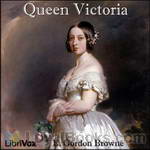 Queen Victoria
Queen Victoria
This book is about the life of Queen Victoria (1819 to 1901). All nine of her children married into the royal houses of Europe. She became the longest reigning monarch and more. This book is a fascinating read about the woman behind the British Empire. | |
By: Emerson Hough (1857-1923) | |
|---|---|
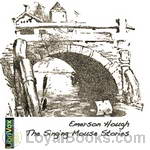 The Singing Mouse Stories
The Singing Mouse Stories
The singing mouse tells tales of nature in songs. This book is for those who want to know how the mountains ate up the plains, what the waters said or where the city went. | |
 The Lady and the Pirate Being the Plain Tale of a Diligent Pirate and a Fair Captive
The Lady and the Pirate Being the Plain Tale of a Diligent Pirate and a Fair Captive
| |
 The Story of the Outlaw A Study of the Western Desperado
The Story of the Outlaw A Study of the Western Desperado
| |
 54-40 or Fight
54-40 or Fight
| |
 Covered Wagon
Covered Wagon
"Look at 'em come, Jesse! More and more! Must be forty or fifty families." This is an old-fashioned adventure tale set on the Oregon Trail, just before the California Gold Rush. It is the story of a wagon train bound for the west, and the conflict which arises due to of a love triangle. Indian fights, buffalo hunts, dangerous river crossings and other dangers of the trail add to a gripping and entertaining yarn. | |
 The Mississippi Bubble
The Mississippi Bubble
| |
 The Way of a Man
The Way of a Man
| |
 The Passing of the Frontier; a chronicle of the old West
The Passing of the Frontier; a chronicle of the old West
| |
 Heart's Desire
Heart's Desire
| |
 The Sagebrusher A Story of the West
The Sagebrusher A Story of the West
| |
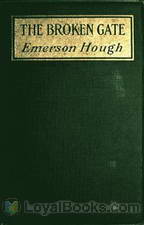 The Broken Gate A Novel
The Broken Gate A Novel
| |
 The Young Alaskans
The Young Alaskans
| |
 The Young Alaskans on the Missouri
The Young Alaskans on the Missouri
| |
 The Man Next Door
The Man Next Door
| |
 The Law of the Land
The Law of the Land
| |
 The Young Alaskans in the Rockies
The Young Alaskans in the Rockies
| |
 The Young Alaskans on the Trail
The Young Alaskans on the Trail
| |
 The Purchase Price
The Purchase Price
| |